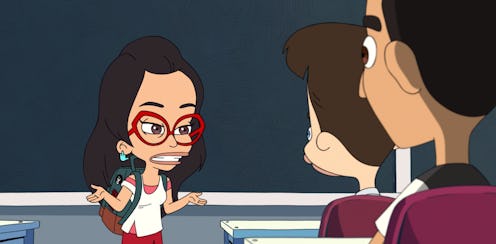Entertainment
'Big Mouth's Co-Creators Say The Show "Missed The Mark" On Explaining Pansexuality

Big Mouth Season 3 explored the spectrum of sexuality as several of the characters came out, but the show's explanation of pansexuality and bisexuality earned criticism from members of the LGBTQ+ community. On Monday, Oct. 7, three days after the season dropped on Netflix, Big Mouth co-creator Andrew Goldberg apologized for the pansexuality definition stated in the show. In a statement shared to Twitter, Goldberg admitted that he and his fellow writers "missed the mark" on the episode. (A representative for Kroll confirmed to Bustle that the statement shared by Goldberg was on behalf of all co-creators — Kroll, Goldberg, Jennifer Flackett, and Mark Levin.)
In the Season 3 episode, "Rankings," Big Mouth introduced a new student, Ali (voiced by Ali Wong), who identifies as pansexual. As part of her introduction to the other students at Bridgeton Middle School, the character explains that being "pansexual means I'm into boys, girls, and everyone in between." When Nick (voiced by co-creator Nick Kroll) asks if that's the same as bisexuality, Ali responds, "No, bisexuality is so binary. Being pansexual means my sexual preference isn't limited by gender identity."
While the rest of the episode explored the prejudices that pansexual and bisexual people can often face, Big Mouth was called out by members in the LGBTQ+ community for "perpetuating ... stereotypes, particularly when it comes to transgender people," per The Advocate. In response, Goldberg released his statement on Twitter apologizing for the episode, and saying that he and his fellow creators "sincerely apologize for making people feel misrepresented."
His statement continued, "Any time we try to define something as complex as human sexuality, it's super challenging, and this time we could have done better." Goldberg also thanked the "trans, pan and bi communities" for explaining their issues with the episode, and promised that the Big Mouth writers and creators were "listening" and would work to improve their representation of the LGBTQ+ community in future seasons.
While bisexuality and pansexuality have a lot of similarities, queer advocacy organization GLAAD broadly defines being pansexual as "being attracted to all gender identities, or attracted to people regardless of gender," while being bisexual simply means "being attracted to more than one gender." In a 2015 piece on pansexuality GLAAD noted that there is a "common misconception" about the bisexual community that "they seek to reinforce a rigid gender binary." However, according to bisexual advocate Robyn Ochs, many people who identify as bisexual have "the potential to be attracted — romantically and/or sexually — to people of more than one sex and/or gender, not necessarily at the same time, not necessarily in the same way, and not necessarily to the same degree."
One of the main issues that members of the LGBT+ community took with Big Mouth's definitions was that they upheld that stereotype of the bisexual community, and implied that people who are bisexual aren't attracted to anyone who is transgender or non-binary. Actor and writer Mara Wilson was among the social media users who called out the show's use of harmful stereotypes of bisexuality, writing on Twitter that the scene was "wrong and irresponsible."
She continued, "to those who think Bi’s aren’t attracted to or don’t date transgender or NB people... I could introduce you to some people who know otherwise." Andi Mack star Joshua Rush — who came out as bisexual in August — also shared his disappointment with the episode on Twitter writing, "i’m just kinda disappointed because clearly not a single bi person was asked about it."
While their portrayal of pansexuality and bisexuality earned criticism from the community, the Big Mouth team has explained that representation is very important to them as they explore stories of puberty and sexual exploration. "Being on Netflix has given us incredible opportunity to speak more frankly in a way that a lot of shows and movies haven’t been able to," Kroll told Esquire in September. "On top of that, I think we still have a responsibility to tell as many different kinds of story around puberty as possible."
Though it is admirable that Big Mouth wants to showcase a variety of experiences, it's also important that those diverse stories are told by a diverse group of people, especially those who have actually gone through those journeys themselves. And based on their statement, it seems that the Big Mouth co-creators are taking steps in the right direction.